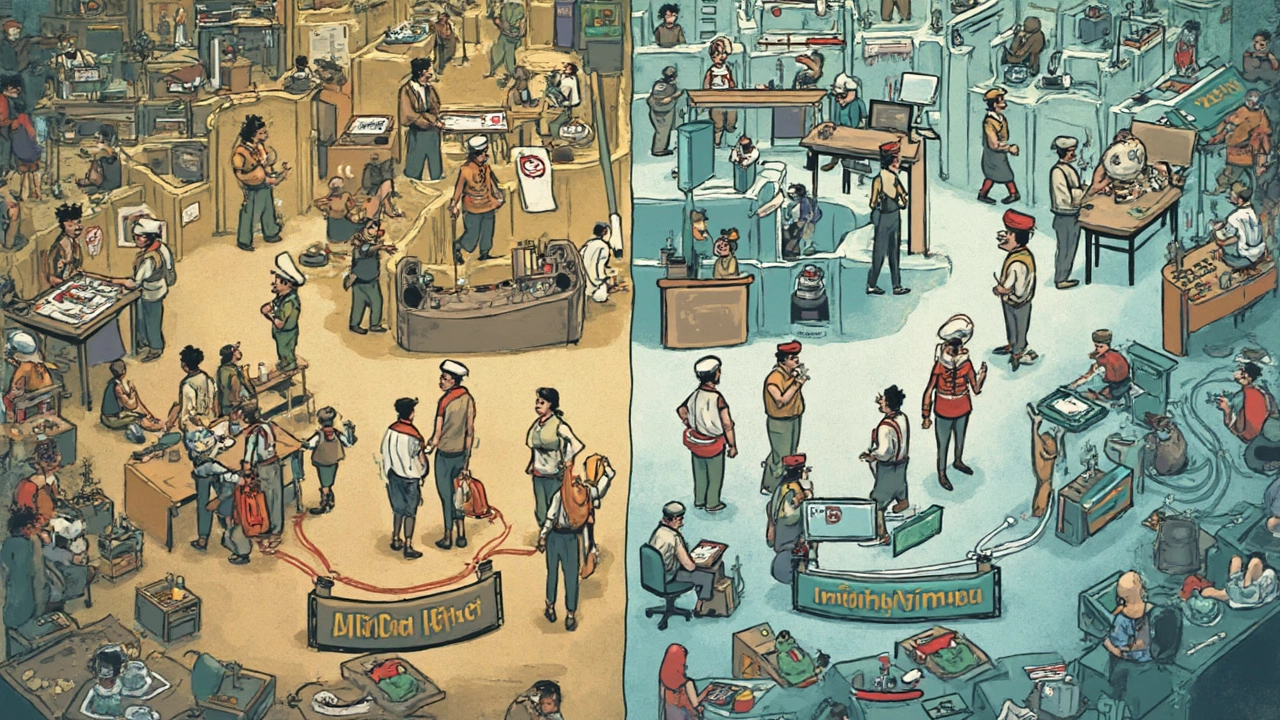You might think it's all about ministers making big speeches, but oversight in manufacturing goes way deeper. Real control is split between different ministries, regulators, and more than a few watchdogs. Each one wants a report or an inspection, and if you've ever tried setting up a small factory, you know what I mean—getting approvals can feel like running a marathon with your shoelaces tied.
It's not just about ticking boxes. The government, through schemes like Make in India and Production Linked Incentives (PLI), has specific bodies to check whether a plant is following safety, quality, and labor rules. And no, it's not just one department. There are ministries for heavy industries, environment, textiles—you name it. Plus, regulatory authorities like the Bureau of Indian Standards (BIS) jump in for certifications, while local inspectors check if things are up to scratch. You can see why process delays are a running joke among business owners at chai stalls.
- Not Just Bureaucrats: The Main Players
- How Oversight Actually Works
- Why It Matters for Businesses (and Consumers)
- Tips for Dealing With the System
Not Just Bureaucrats: The Main Players
If you think manufacturing oversight is just about one government guy with a file, you’d be way off. It’s a crowded stage with ministries, regulators, auditors, and on-the-ground inspectors. Each has its lane, and sometimes, they overlap in ways that keep even the most seasoned business owners scratching their heads.
So, who actually holds the real power in manufacturing oversight? Here’s a quick breakdown of the big names and their turf:
- Ministry of Commerce and Industry: Sets the overall policy and gives the green light to major projects. Their wing, the Department for Promotion of Industry and Internal Trade (DPIIT), is heavily involved with government schemes and foreign investments.
- Ministry of Micro, Small and Medium Enterprises (MSME): Looks after the concerns of smaller manufacturers—think of those family-run units and startups. They provide approvals and make sure businesses get their piece of government incentives.
- Bureau of Indian Standards (BIS): If your product needs a quality stamp, these are the folks you talk to. They run strict certifications across products from electronics to building materials.
- Local State Pollution Control Boards: This is big if you’re dealing with chemicals, dyes, or anything that can pollute air or water. No clearance from them? You can’t even switch on your machines.
- Labour Departments: Often overlooked, but critical. These officials drop in to see if labor laws are followed—think safety gear, fair wages, and working hours.
Just to show you how all this adds up, here’s a quick look at approvals and inspections in practice:
| Body | Main Role | Usual Wait Time (Average) |
|---|---|---|
| DPIIT | Project approval, foreign investment | 60-90 days |
| BIS | Product certification | 30-45 days |
| State Pollution Control Boards | Environmental clearance | 60 days |
| Labour Department | Compliance checks | Random inspections |
It’s not just about ticking the right boxes. All these players have their own rules and paperwork. Missing a single form or not having the right person to talk to can set you back weeks. If you’re planning to start or scale, you’ve got to know who’s who and what they actually care about. That’s the only way to keep the process from eating your time—and your sanity.
How Oversight Actually Works
If you think manufacturing oversight is just paperwork and rubber stamps, you might be surprised. It’s a pretty hands-on process—sometimes literally, as inspectors don’t mind rolling up their sleeves for a surprise visit. Here’s how the system plays out on the ground:
First, every factory or plant in India needs clearances, and these are split across multiple departments. The Ministry of Commerce and Industry, for example, has to give the green light for a ton of projects under government schemes. The Ministry of Environment, Forest and Climate Change steps in for environmental approvals—think pollution, waste treatment, all that stuff that neighbors really care about. If you manufacture electronics, the Ministry of Electronics and Information Technology is crawling all over your paperwork.
But it’s not just ministries throwing rules around. Actual regulators play a big role. The Bureau of Indian Standards (BIS) is the go-to for checking product quality; without their stamp, good luck getting your product onto shelves, especially if it's a helmet, a pressure cooker, or even a simple wire. Their checks can be strict—you’ll get pulled up if the material doesn’t match the standard, even if nobody but an engineer would notice.
Here’s what usually happens after you apply for a government scheme or set up a unit:
- Someone from the right ministry does a doc check—have you filled 10 forms or just 9? Missing a page means a longer wait.
- Local authorities, sometimes the District Industries Centre, drop by for a site inspection. They look at everything from fire safety to whether toilets are there for workers.
- Environmental or labor officials can show up anytime for a compliance audit. If you’re found flouting rules, you’ll get slapped with notices or fines on the spot.
- Periodic audits: Even after you’re set up, recurring checks happen for most medium and large manufacturing units—sometimes random, sometimes based on a schedule.
What throws many newbies is how these bodies often work separately, so getting clearance from one doesn’t mean the others say yes. That’s why even the pros have folders stuffed with approvals, NOCs, and compliance certificates. It’s a hassle, but it does keep shady players in check (most of the time).

Why It Matters for Businesses (and Consumers)
If you think manufacturing oversight is boring paperwork, think again. For businesses, having someone keep an eye on things can mean the difference between smooth sailing and endless legal headaches. Miss a standard, and suddenly your shipment's stuck at the port or your license gets suspended—happens more often than people admit. For consumers, it's pretty simple: oversight is why your new fridge doesn't explode or your medicine actually works.
Here's where the manufacturing oversight piece comes in. When factories follow rules set by bodies like the Bureau of Indian Standards (BIS) or the Food Safety and Standards Authority of India (FSSAI), it keeps products safe and quality consistent. India has almost 20,000 BIS certified products as of 2024, showing just how widespread these checks are. Without this system, the market would be flooded with risky or fake products—which no one wants.
Businesses face a tricky balance. On the one hand, they want less red tape, but on the other, strict oversight can actually be good for them in the long run. Strong compliance boosts reputation, makes it easier to export, and helps avoid nasty lawsuits. A 2022 survey from the Confederation of Indian Industry found that 78% of manufacturers said clear and predictable regulations actually helped their growth plans, especially in export markets.
For the average person (like my friend who swears by branded electricals after his ceiling fan caught fire), oversight means fewer safety scares and value for money. Here’s a simple rundown:
- Products with BIS or government-approved marks usually last longer and work better.
- Food and medicines with regulatory stamps are less likely to have harmful chemicals or fake ingredients.
- Strict labor checks mean fairer wages and safer workplaces for factory employees.
Some numbers say it best. Check out how product recalls shake out when oversight gets tighter:
| Year | Products Recalled (India) | Main Reason |
|---|---|---|
| 2021 | 153 | Quality Issues |
| 2022 | 117 | Non-compliance |
| 2023 | 89 | Labeling and Safety |
As the rules get stricter, the number of recalls drops—a win for everyone. And if you're a business, getting compliance sorted early means less stress and better customer trust. Next time you're annoyed by all those forms, just remember: they're the reason your gadgets, snacks, and medicines aren't a game of Russian roulette.
Tips for Dealing With the System
If you’re hoping to navigate manufacturing oversight without losing sleep, getting organized is half the battle. With so many government bodies, forms, and site visits, shortcuts usually backfire—just ask anyone who’s ever tried bribing a local inspector and had it spiral out of control (hint: not worth the risk).
One smart move is to make a checklist of all the required clearances for your sector. For example, most manufacturing units need approvals from the Pollution Control Board, fire safety department, and labor office before they can even start operations. Forgetting just one can stall your project for months. A simple Google search for “permissions required for [your industry] manufacturing India” gets you most of the way, but double check everything on official state websites. They’re clunky, but usually updated.
Don’t ignore certifications either. Stuff like BIS standards, ISO compliance, and FSSAI (for food) are dealbreakers for selling your products nationwide or exporting abroad. If your factory skips these, you’ll get stuck at the customs gate faster than you can say ‘consignment rejected.’
- Talk to other manufacturers in your area. They’ve probably dealt with the same inspectors and can give real advice, not textbook answers.
- Hire someone who knows their way around government offices. A local consultant or liaison officer might cost extra, but they save weeks of paperwork pain.
- Digitize your documents. Keeping scanned copies of completed forms, licenses, and inspection reports can save you when an officer asks for the same thing twice—which, trust me, happens more than you’d expect.
- Stay updated. Government norms change all the time, especially under schemes like Make in India. Follow industry news or subscribe to updates from the relevant ministry. It’ll help you avoid nasty surprises.
And here’s a low-key hack: Be polite with officers and inspectors, but never seem desperate. It usually gets you better cooperation. Most folks just want the job done efficiently because they’re juggling a hundred other site checks. Respect their time, and you might just get your file pushed to the top of the pile.
